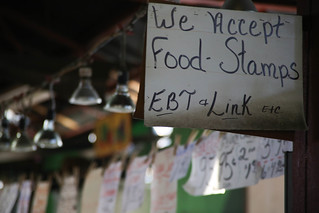Food Stamp Benefits Will Be Cut By $5 Billion Beginning Nov.1

The Recovery Act of 2009 increased and extended benefits in response to the recession. This expansion will be curtailed starting Nov. 1 despite high unemployment rates and an economy that still has not fully recovered.
The Center on Budget and Policy Priorities made a series of comparisons detailing benefits before and after the cuts take effect. This data says that "the cut is equivalent to about 16 meals a month for a family of three" and that "without the Recovery Act's boost, SNAP benefits in fiscal year 2014 will average less than $1.40 per person per meal."
What isn't mentioned, however, is how these families plan on making up for the lost meals. Moreover, what would happen to the projected 3.8 million current recipients who will be denied food aid in 2014 if a House version of the Farm Bill passes?
"Having $40 cut from SNAP benefits is a hit," says Fred Summers, Director of Operations at the SOVA Community Food Resource Program of Jewish Family Services. "That's a lot of food."
Especially at $1.40 per meal. The $40 refers to the estimated amount cut monthly from an average family of four in the program. People denied food aid through SNAP will inevitably have to reach out to local pantries for help--but pantries aren't doing well either.
Just this year, as the LA Regional Food Bank celebrates its 40th year of operation, it also, for the first time in its history, has a wait list of agencies seeking food. The recent government shutdown worsened the supply chain, as distribution of funds for several food aid programs stalled.
Jennifer Errico, the Communications Director at the LA Regional Food Bank, explains that when cuts are made to programs like Cal Fresh (the food stamp program in California), these participants go into food pantry lines for help.
"We cannot increase the amount we are giving out, because we're already stretched so thin," adds Errico.
"For a couple of months, all we had were carrots and beans," says Mason. "It was terrible."
Variety in food and access to protein have suffered the most, according to Mason. Where pantries were receiving seven different varieties of food just six to eight months ago, they are now only receiving three varieties instead.
"Meat has always been a challenge," says Mason. "We actually have tried to raise money so we could purchase meat on our own, but even that meat that used to be available for purchase is gone."
Mason says the pantry had to close its doors early a week ago, for the first time, because they simply ran out of food to give. Worse, since a household can only visit a particular pantry once a month, many might not have been left with any other option for food.
Summers and Mason emphasize that cuts to food stamps go beyond just the issue of food. Both organizations offer other key services as well. As Summers says, "People who are struggling to keep enough food on the table have a lot of other challenges too."
Their respective pantries are apart of larger organizations offering additional resources. SOVA offers services ranging from utilities assistance and discounted dental work to access to legal counsel. HCHC offers permanent housing for those who qualify under low income. And both have representatives from the Department of Public Social Services visit their site to help people who qualify for food stamps apply to Cal Fresh.
The impact these organizations make in the lives of the people they help best explains why added pressure to the pantries isn't warranted.
Richard Miller is a current resident of HCHC. Six years ago, Miller became homeless for the first time in his life.
"I was always well dressed--never looked homeless," says Miller.
After both Miller's boyfriend and his brother moved out of the apartment they all shared, he could no longer afford all the bills himself. Miller decided to live out of his car until it broke down. He then ended up sleeping on the street near the Social Security Office on Vine St. and Santa Monica Blvd.
"I wasn't making enough money to be able to get my own place again," says Miller. "I mean, you have to pay for your deposit, first month's rent, your lights, your gas, your water and to get it all in your name. I wasn't able to do that."
Worse, Miller had no idea he was sick. He didn't know he had stomach cancer. As his illness worsened, Miller was able to get the medical attention he needed and heard about HCHC where he was able to qualify for housing.
"I got such a good night of sleep the first night I was there," says Miller.
Even though he now had shelter, he needed a consistent source of food, especially in his condition. He was able to work with the pantries in the area to create a reliable way of getting the food he needed. Still, his most recent visit to the HCHC food pantry would be lacking in protein, an essential part of his diet.
With an already slim offering at the HCHC food pantry, Mason worries about having enough food for people once the cuts to SNAP take effect. Increased demand for food in the pantries will affect current recipients of SNAP, but will also put a strain on others who are in need of food, but don't qualify for federal food assistance. Additionally, if food shortages become common at the pantries, many won't be able to foster personal relationships with the pantry coordinators. And without these relationships, many in need will lose a critical resource for referrals in getting help for other basic needs.
Miller, who now volunteers at a food bank himself, expresses his gratitude to HCHC. He says, "They do so many wonderful things for me. They're like family to me. And I just, I love them."



